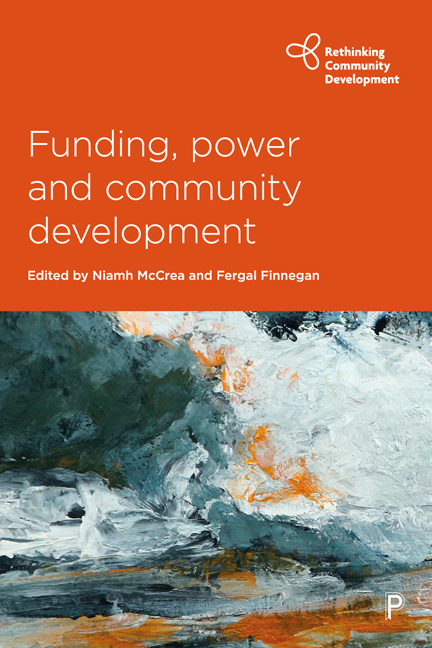Book contents
- Frontmatter
- Contents
- Series editors’ preface: Rethinking Community Development
- Acknowledgements
- Abbreviations
- Notes on contributors
- One Funding, power and community development: an introduction
- PART 1 New configurations of power and governance
- PART 2 Questions of state and grassroots democracy
- PART 3 Modes of agency and horizons of possibility
- Index
Six - Corporate funding and local community development: a case from the mining industry in Australia
Published online by Cambridge University Press: 19 April 2022
- Frontmatter
- Contents
- Series editors’ preface: Rethinking Community Development
- Acknowledgements
- Abbreviations
- Notes on contributors
- One Funding, power and community development: an introduction
- PART 1 New configurations of power and governance
- PART 2 Questions of state and grassroots democracy
- PART 3 Modes of agency and horizons of possibility
- Index
Summary
Introduction
Since the 1990s the role of the private sector in community development has become more overt and widespread (Blowfield, 2005). This has its roots in a ‘growing belief that corporations alone have the power to catalyse development’ (Welker, 2009: 146), and the parallel decline of the state as a central development actor (Richey and Ponte, 2014; Banks et al, 2016). The involvement of business tends to occur under the banner of corporate social responsibility (CSR), with ‘a range of development effects, some intended, some not’ (Banks et al, 2016: 246). Business participation, particularly in the mining sector and as framed by pro-business bodies such as the International Council on Mining and Metals, tends to focus on ‘the social, economic and institutional development of host countries and communities’ (ICMM, 2017b, emphasis added). Indeed, the mining industry, widely acknowledged as leading the adoption and refinement of CSR (Kapelus, 2002), is a global exemplar of private sector involvement in the funding of community development. Corporations undertaking mining operations in remote locations ‘often assume a state role’ in precipitating and, to a lesser extent, subsidising public infrastructure (Welker, 2009: 146). In Australia, mining companies have historically been central actors in the development of local communities, just as the mining sector continues to provide ‘services and development opportunities’ to remote communities, ‘supplementing, and in some cases substituting, the state in providing essential health, education and community facilities’ (Cheshire, 2010: 19).
This chapter elucidates the social and political complexities of corporate community development as practised in the mining industry, with attention to implications for meanings of ‘community’ and ‘development’. This is achieved through examination of corporate funding of community initiatives in the rural Shire of Ravensthorpe in Western Australia, the greenfield site of the Ravensthorpe Nickel Operation (RNO), owned by BHP Billiton (hereafter BHPB) until 2010. I draw on substantive empirical data collected during a two-year ethnography in the Shire encompassing 120 semi-structured interviews conducted in 2006 to 2008 with community members, local representatives, business people and corporate staff. Field work spanned the end of the mine's construction phase and its operationalisation, including the official opening in May 2008.
- Type
- Chapter
- Information
- Funding, Power and Community Development , pp. 85 - 100Publisher: Bristol University PressPrint publication year: 2019



